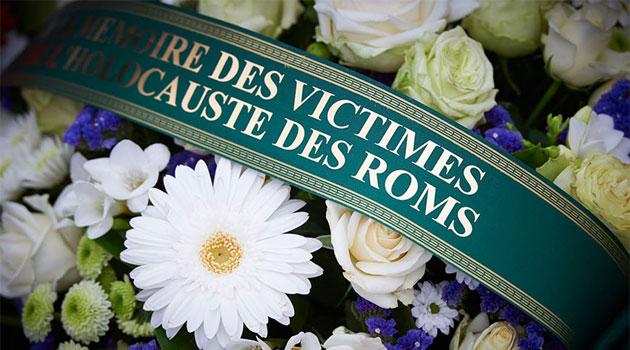Czech religious representatives fly Roma flag in honor of Holocaust victims

Yesterday in Prague the Roma flag was flown together with the flags of three religious societies in the Czech Republic in honor of the victims of the Roma Holocaust. From 2 August to 3 August 1944, almost 3 000 Roma and Sinti were murdered in the concentration and extermination camp of Auschwitz-Birkenau, and 2 August is therefore commemorated as Roma Holocaust Memorial Day throughout Europe.
“It is sad that even after such a long time we must continue to fight for our rights,” Romani activist Jozef Miker said at a press conference yesterday. Miker reminded those present that his parents actually met at a transit camp in the Slovak State during the war.
“I did not know that there were 12 transit camps for Roma and Sinti on the territory of the Protectorate of Bohemia and Moravia until I met my wife. Three-quarters of those families perished in the concentration camps,” Miker said.
Miker also reminded those present of the former camp at Lety by Písek, the site of which is occupied by a pig farm to this day. “It’s sad the communists built a pig farm on a Roma Holocaust site, but the worst thing is that even after 27 years of so-called democracy, it’s still there,” Miker said.
“There is a memorial there, but we cannot honor their memories at it because when the wind blows, nobody can stay there [because of the smell from the farm]. Romani people will never be respected in the Czech Republic until the pig farm at Lety is demolished. We don’t have to love each other, but we can live alongside one another in mutual regard and tolerance,” the activist said.
Miker also did his best to refute the disinformation that those who died at Lety did so solely because of typhoid and that it was not, therefore, an extermination camp. “The Vlach Roma disappeared without a trace, their property was immediately sold to the peasants. […] The children were loaned out to work for the neighboring peasants, according to my grandfather and great-uncle, and they looked forward to it because they would at least get some food, they got nothing in the camp,” he said.
The Evangelical Church of Czech Brethren, the Jewish Community of Prague, and the Žižka Chorus of the Czechoslovak Hussite Church also joined this year’s commemoration of the events at Auschwitz at the beginning of August 1944. All three organizations flew Roma flags yesterday afternoon at their Prague headquarters.
“More than 70 years since the war ended, the suffering of the prisoners of the concentration camps has become a symbol, but the suffering of some groups is forgotten or minimized. That is why the Evangelical Church of Czech Brethren wants to remind everybody that there was also a Roma Holocaust,” said clergyman Mikuláš Vymětal.
According to David Tonzar, the Prague Bishop of the Czechoslovak Hussite Church, it is necessary to talk about past events today, when religious radicals are suppressing other religious groups and non-religious people. “The murder of Roma and Sinti is a reminder to us of the cruel memory of our own indifference and pusillanimity when it came to resisting the ideology of Nazism and its administration of power. I believe that today, after the experiences of the wars and the extermination practices of the 20th century, we are able to better resist both physical and spiritual violence and to defend the lives of people of all ethnicities and religious groups who are not intent on liquidating others,” Tonzar said.
The Federation of Jewish Communities was also involved in the activities. “In today’s problematic era, when people like hearing simple solutions and are succumbing to them, there is a tendency to see the world as black-and-white, but the Holocaust is a reminder that must be constantly revisited so that history does not repeat itself,” said the chair of the Federation, Petr Papoušek.
At 19:00 a cultural-spiritual gathering was scheduled to take place at the Church of the Czechoslovak Hussites in the Žižkov quarter. Holocaust survivors and their descendants were scheduled to speak and the Romani dance ensemble Gitanne was scheduled to perform, as was the Romani rap group BroKing, and traditional Romani cuisine was to be served before the evening ended with a shared dance.
From 1942-1943 the camp at Lety was a prison in which Romani people from Bohemia were concentrated. A total of 326 children, men and women met their deaths in its inhuman conditions.
Another 540 prisoners were sent from Lety to the extermination camp at Auschwitz-Birkenau, which became the biggest concentration camp for the Roma of Europe. Most of those imprisoned there perished in the gas chambers.
The extermination policy of Nazi Germany led, according to estimates, to the deaths of half a million Romani people from all over Europe. Some estimates are as high as 800 000 Romani victims, which represents anywhere between one-fourth to one-half of the prewar Romani population.
